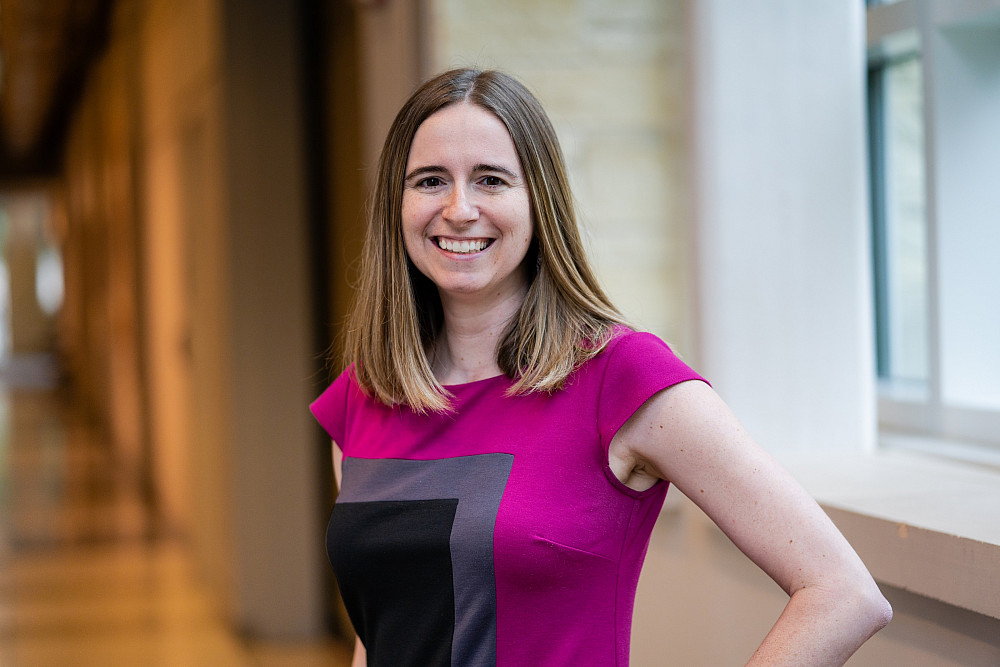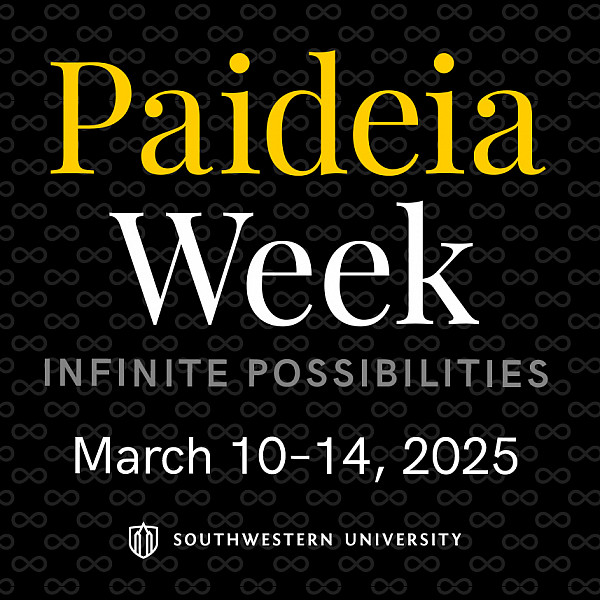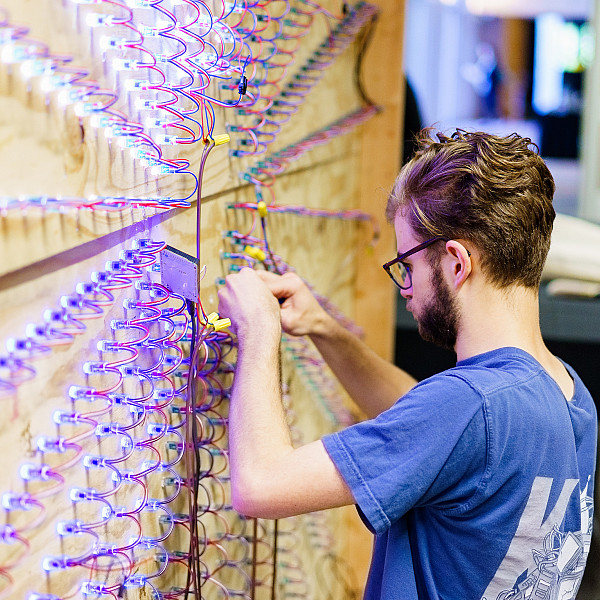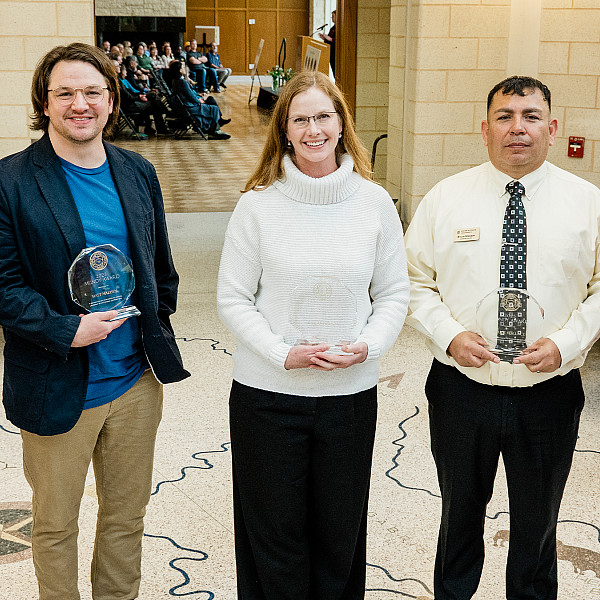News
Inspiring the Next Generation of Women Mathematicians this Women’s History Month
Garey Chair and Professor of Mathematics Alison Marr uses her own experiences as a female mathematician to inspire the next generation of learners while also playing a pivotal role in enhancing the Southwestern community.
March 06, 2025
March 06, 2025
Open gallery

Garey Chair and Professor of Mathematics Alison Marr was destined to inspire the next generation of students through math. Growing up in Kentucky, Marr quickly developed a passion for teaching.
“My mom would buy me teacher’s editions of elementary school textbooks and then I would make a full lesson plan and teach my stuffed animals,” Marr recalled. “Then I would make the next day’s lesson plan based on whatever happened.”
From a young age, Marr set her sights on becoming a high school math teacher. However, during her undergraduate days at Murray State University, Marr’s advisor opened her eyes to the world of collegiate professorship, where she would be able to both teach students and continue her passion of conducting mathematical research.
While at Murray State, Marr was introduced to the EDGE Summer Program, a non-profit organization dedicated to increasing gender and racial equity in mathematics. Short for Enhancing Diversity in Graduate Education, EDGE was founded in 1998 by Spelman College’s Dr. Sylvia Bozeman and Bryn Mawr’s Dr. Rhonda Hughes with the goal of strengthening the ability of female students to successfully complete graduate programs in the mathematical sciences.
Through her participation in the EDGE Summer Program, Marr earned her masters degree from Texas A&M University before completing her Ph.D. from Southern Illinois University. Shortly after earning her Ph.D., Marr joined the faculty at Southwestern. In a full-circle moment, Marr was invited to become the latest Co-Director of the EDGE Summer Program in 2020.
“Some of the most famous mathematicians in the field have co-directed that program, so it’s crazy to me that my name is up there,” Marr said. “To be asked to do that was an incredible honor, but also an incredible responsibility to continue the success of the program and be a mentor and advocate for the next generation of mathematicians.”
Although women earn about 50% of total undergraduate degrees in mathematics nationwide, statistics from EDGE show that women account for only about 30% of Ph.D. degrees in mathematics, with women of color making up less than 10% of that group. Since the founding of the EDGE Summer Program, 23% of all Black women who earned a Ph.D. in mathematics in the United States are EDGE alumni. In total, 90% of EDGE alumni have received either a graduate degree or are currently in graduate school, and another 143 EDGE alumni have earned their Ph.D., including Marr.
“It’s probably the most important work that I do,” Marr said. “It changes lives. It’s important to make sure that women are able to be successful in those spaces when they are still told they don’t belong. Some women are admitted and still told, months into their program, ‘you don’t belong here.’ It’s hard for me to hear those stories. I hear them every year and it’s heartbreaking.”
At Southwestern, Marr played a pivotal role in helping students interested in science, technology, engineering, and mathematics (STEM) fields adjust to the rigors of collegiate life. In 2016, she co-founded Southwestern’s EQUIP program along with fellow Professor of Mathematics Fumiko Futamura. EQUIP, short for Enhancing Quantitative Understanding and the Inquiry Process, is designed to build a community for first-year students who are interested in completing a degree in a STEM field.
Students who participate in EQUIP stay on Southwestern’s campus for a week during the summer before their first year, where they participate in daily math activities and exercises that provide immersive learning experiences. Outside of the classroom, students are introduced to life at Southwestern and in the Georgetown community. Following the on-campus portion, students complete a four-week online course to continue practicing math at home. When the fall semester begins, the participants are reunited in a First-Year Seminar course that builds on the summer program.
“We want to create spaces where people feel welcome and comfortable to be themselves, but still do math and science,” Marr said. “EQUIP provides a space to hopefully help students who come from totally different high schools all over the country come together for one week to talk about math and get used to what the inquiry-based classroom looks like.”
In her own classroom, inquiry-based learning is at the center of Marr’s teaching philosophy. This spring, Marr introduced a new special topics course, titled Women in Graph Theory and Combinatorics, where students explore the work of five contemporary female mathematicians. Throughout the course, students engage with scholarly papers published within the last 10 years, gaining experience in reading and understanding advanced mathematical research while also learning about the women behind it.
“I structured the class to be inquiry-based,” Marr said. “I give the students a whole bunch of questions to solve, and they come in and figure them out. I’m not doing too much lecturing, so the students are kind of driving the class and driving the problem solving, which is very fun.”
Women in Graph Theory and Combinatorics was initially inspired by a course Marr developed in 2023 for a study abroad program in London. In that course, Women Count!, Marr and her students focused on different British-affiliated female mathematicians and analyzed the book Inventing the Mathematician, which is about why the Western world doesn’t think of women as mathematicians.
“In math classes, we know of Newton and Leibniz and Euler and Gauss,” Marr said. “It’s the same sort of story and I think it gets a little tiring. If I’m going to have a bunch of math majors in my class, I’m going to teach them about math that’s done by women, and that’s being done right now.”
Marr’s innovative and engaging approach to teaching led to the opportunity to add another role to her already impressive résumé – Director of Paideia. As the new “face of Paideia,” she was entrusted to oversee Southwestern’s interdisciplinary approach to education, one that embodies the liberal arts and empowers students to think in broader, more collaborative, and more original ways.
In the role, she is working to align Paideia seminars so that they all meet similar goals, ensure first-year students have the opportunity to engage with Paideia, and give faculty the opportunity to think about how to incorporate Paideia into their courses through professional development sessions.
“It’s all about thinking globally about what Paideia is,” Marr said. “How do we experience Paideia as a campus? How do we make sure that all students have some sort of Paideia experience in their time at Southwestern? How can we make it more of a culture and not just a word that you might hear?”
One of her first big events as Director of Paideia is the upcoming Paideia Week, beginning on Monday, March 10 and culminating with Pi Day on Friday, March 14. The week-long celebration of Southwestern’s spirit of interdisciplinary learning will allow students to participate in thought-provoking conversations, fun challenges, and new experiences that spark curiosity and build community.
“It’s a way to engage with Paideia if you haven’t already,” Marr said. “There are small ways to do that throughout the week that aren’t as big of a commitment as enrolling in a seminar or studying abroad. We want to offer quick ways to learn about Paideia, find out about high-impact experiences, and engage with each other. Connection is such an important part of Paideia.”
As a testament to all of her contributions to the Southwestern community and outstanding abilities as a teacher-scholar, President Laura Skandera Trombley named Marr one of five recipients of the prestigious Joe S. Mundy Award for Exemplary Service in February. Looking back at her 18 years of service at SU, Marr gives all credit to her students.
“The most rewarding part is the student stories,” Marr said. “It’s great to have a student here and then see them out in the world doing amazing things. And it’s not just my math majors – there are my advisees and students that I might have had just for one class or during my first-year seminar – they’re all out in the world doing really cool things, and that is so rewarding.”


















